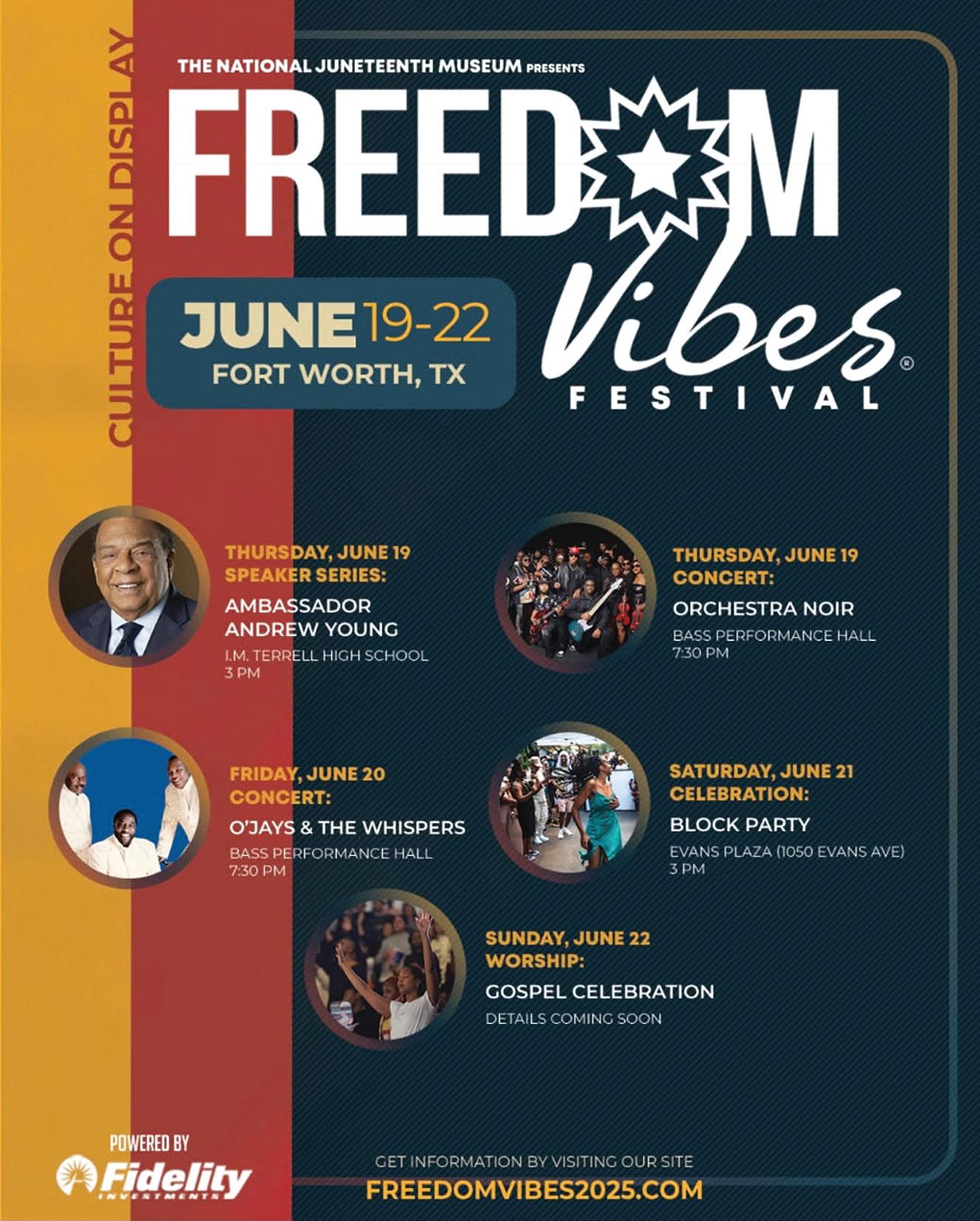

Como Sculptural Plaza Recognized at International Exhibition
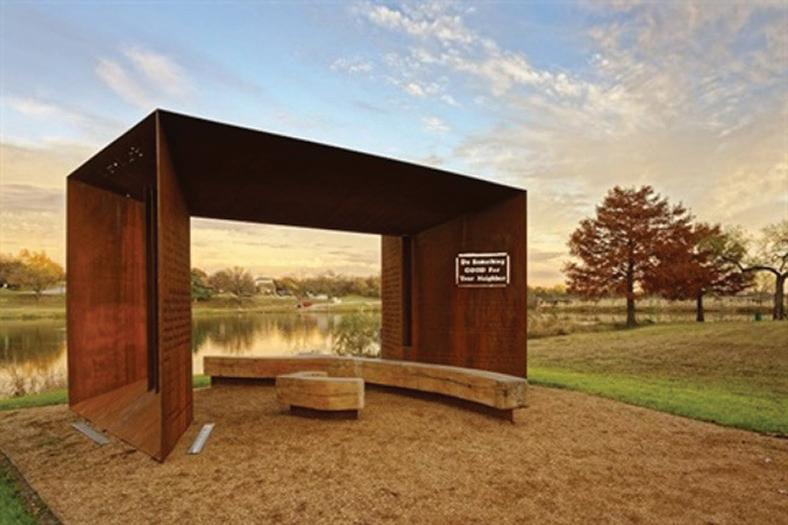
A public art installation in Fort Worth’s Lake Como neighborhood is one of 54 projects being exhibited this summer in Venice, Italy.
Why it’s important: The installation was selected for
“PORCH: An Architecture of Generosity,” commissioned by the U.S. State Department and organized by the Fay Jones School of Architecture and Design at the University of Arkansas, in partnership with DesignConnects and the Crystal Bridges Museum of American Art. About the sculpture: The Como display, titled Do Something Good For Your Neighbor, honors community leader William H. Wilburn
Sr., Lake Como Park founder and editor of The Lake Como Weekly, and Amon G. Carter Sr., whose gift of land established Lake Como Park in 1952. If you go: Visit the sculptural plaza at 3401 Lake Como Drive, Fort Worth 76107. The public art project was funded by the 2004 Bond

Program and dedicated Dec. 4, 2021.
A vertical metal plate that makes up the two sides of the frame echoes text excerpts from The Lake Como Weeklyarchives and other historically relevant documents with cut-outs and engravings. Angled toward the sky, two triangular plates listing Wil-
burn and Carter honor the two men. Two hand-carved white oak benches mimicking the surrounding landscape are housed within the sculpture to offer a place for reflection.
More about Lake Como Park: Do Something Good For Your Neighbor is the first artwork completed as part of the Lake Como Park Public Art
Master Plan. The plan identifies aesthetic and functional elements to increase the community’s use and enjoyment of the park through improvements to existing infrastructure and the addition of new park amenities with integral elements commemorating important people and events of the Como community’s history.
The Fort Worth Association of Federated Women's Clubs Serving the Community Since 1917

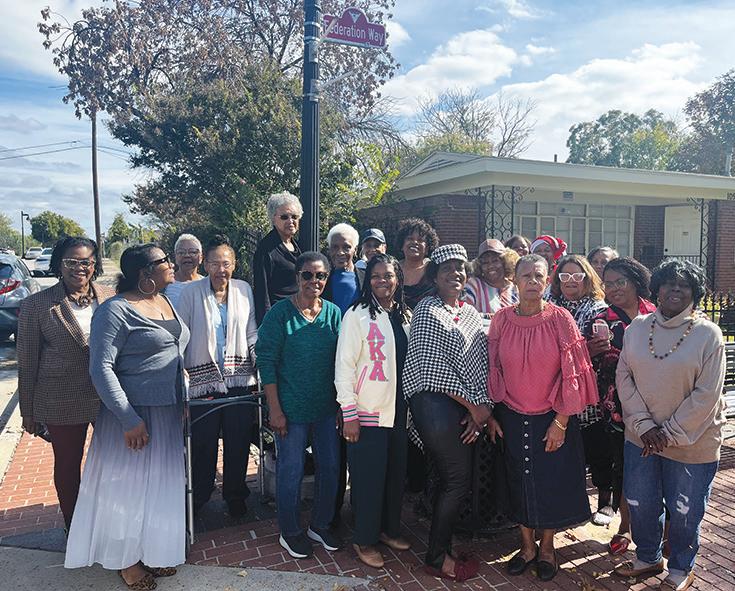
The Fort Worth Association of Federated Women's Clubs (FWAFWC) was established in 1917 and was initially known as the Fort Worth Association of Colored Women's Clubs. It emerged from the Women's Suffrage Movement and focused on family improvement through educational, literary, cultural, and public service initiatives, while also addressing the discrimination and negative public perceptions faced by Black women.
Over the years, the club and its member organizations have adapted to changes and challenges within the community by focusing on contemporary issues, including com-
munity service, gender equality, and social justice. They continue to support advocacy, education, and cultural expression in their efforts to improve social and economic conditions.
In 1932, the leaders of the FWAFWC set a goal to acquire a building to serve as a club home. The vision for this building was to create a space where FWAFWC and its member clubs could meet both individually and collectively. This facility would facilitate the collaboration, development, and implementation of activities and programs designed to enrich the community.
The vision for a club home was realized around 1954 with the completion of a 1,749 square-foot facility. Over the years, this building has hosted club meetings, fundraising events for scholarships, numerous community service projects, and events organized by other civic organizations.
Today, the club's home continues to serve as a hub for community service activities. In addition to monthly meetings, the building hosts social events for senior citizens, serves as a food distribu-
Please
Black Soldiers to Be Celebrated at African American
War Memorial on Juneteenth
June 19th to begin steps toward grand opening of new museum
By Hazel Trice Edney
Juneteenth, the June 19th federal holiday that commemorates the end of America’s slavocracy and celebrates freedom for African-Americans, comes this year amidst diminishing respect for the contributions of enslaved people and their descendants.
But leading historians around the nation are intent on restoring and growing that respect. That includes by honoring those Black soldiers who not only fought for freedom, but who traveled to Galveston, Texas with General Gordon Granger to inform the more than 250,000 enslaved people there that their freedom had been won.
Dr. Frank Smith, founder and executive director of the African American Civil War Museum and Memorial, based in Washington, DC, this week announced a histor-
ic gathering at the Memorial located across the street from 1925 Vermont Avenue NW, where the museum is under renovation and reconstruction. That gathering, under a huge tent, will start at 11 am on June 19th, and will begin a 6-month long celebration –steps toward the grand opening of the new museum.
“We will celebrate by assuming a team of readers who are going to read the names of about 6,000 African-American soldiers of the United States Colored Troops who went to Galveston, Texas with General Granger on that fateful day in June to announce to the last holdouts that the Civil War was over, that the 13th amendment had passed, and that the Emancipation Proclamation had been signed,” Smith describes. “They stayed there for two years to ensure the newly freed people

were truly freed and not reenslaved to the same corn and sugar cane fields that they had been forced to work.”
Once the names of those heroic soldiers are read, the public will be given the first opportunity to take a “sneak peek” at the renovations across the street, set to open amidst a grand celebration on Veteran’s Day, Nov. 11. That grand opening had been set for July 18, the Anniversary of the Battle of Fort Wagner during which Black soldiers proved themselves to be valiant fighters, winning wide respect and attracting thousands more Black soldiers into the Union Army. But the July 18 date had to be postponed after Congress cut federal funds from the District of Columbia budget; including money for construction on the museum proj-
Do Something Good For Your Neighbor, an artistic sculptural plaza at Lake Como Park, is inspired by the location’s natural beauty and rich history.
The general public will be given a sneak preview of the construction renovation at the African American Civil War Museum on Juneteenth following an 11 am ceremony honoring Black soldiers who fought in the Civil War.
PHOTO: Hazel Trice Edney/Trice Edney News Wire

Overgrown Trees Can Threaten Your Home During Storm Season

Spring is here! Homeowners in North Texas must pay close attention and maintain their property’s tree health because severe storms and heavy rainstorms are currently affecting the region. The heavy storm season shows me that neglected tree growth leads to substantial home damage which can cost homeowners lots of money.
Branches: A Risk to Roofs, Siding, and Windows
The proximity of tree branches to houses creates no apparent threat until powerful gusts of wind or heavy precipitation strikes. Heavy winds can break roof shingles which create holes that allow water to enter homes. The
Black Soldiers to Be Celebrated
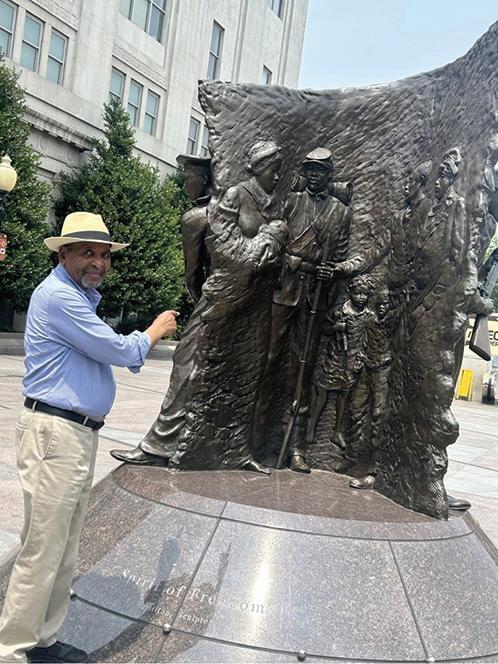
Dr. Frank Smith, founder and executive director of the African American Civil War Memorial and Museum, stands next to the U Street Memorial in Washington, DC where the Juneteenth celebration will take place under a big tent starting at 11 am on June 19th. The names of 6,000 of the more than 200,000 soldiers and sailors will be read that day in honor of those who traveled to Galveston, Texas to announce the end of American slavery to those people still enslaved.
Hazel Trice Edney/Trice Edney News
ect, which is costing about $45 million. The cut funds will be recovered in August in time to complete the construction for the Veteran’s Day grand opening celebration.
Just across the street from the museum, which is housed in the historic Grimke School building on Vermont Avenue North West, is the bronze memorial, a statue of three soldiers standing guard. The statue is surrounded by a wall with the carvings of 209,145 names of those who served among the United States Col-
Talking R eal e s TaT e
with Stephanie Spann
worst situation occurs when a large branch breaks free from the tree. The roof damage from this incident could be severe enough to create major structural problems and total roof collapse. When tree limbs slide down your house exterior, it can create damage to siding materials and break windows which leads to expensive repairs that extend beyond storm duration.
Gutters and Leaves: A Costly Clog
Even when it’s not storming, falling leaves from nearby trees can wreak havoc and can cause problems in regular weather conditions. For example, water cannot drain properly when gutters be-
Continued from page 1
ored Troops.
Smith says between Juneteenth and Veterans Day, “We’re going to read aloud the names of all 209,145 Black soldiers. We’re going to render them unto the universe. We’re using the names they used on the battlefield.”
That museum and memorial – fixtures in the U Street community for the past 21 years – are about to undergo a $45 million expansion project that will accomplish the second purpose for which the museum was built.
The Juneteenth celebration
come clogged which leads to damage of both your siding and foundation. Freezing water that remains in gutters during winter months creates ice dams which increase gutter stress and create roof leakage risks.
An Open Door for Pests
The proximity of tree limbs to roofs can also allow pests to easily gain access while creating both structural problems and pest entry points.
Overhanging branches can create a perfect way to enable squirrels, raccoons, and rodents to use them as pathways to the attic space where they can potentially establish nests while damaging insulation and causing extensive harm.
Termites alongside other insects can ride tree branches to invade your home structures.
of freedom across the nation will be followed by the July 18 celebration of the Battle of Fort Wagner, which will feature a film festival showing the movie, “Glory”, starring Denzel Washington, Smith says. Those two dates will represent the first two steps toward the grand opening.
The next step will be on September 22, a commemoration of the Battle of Antietam.
It was after that historically bloody battle that President Abraham Lincoln first issued the Emancipation Proclamation demanding that the seceded states return to the Union by January 1 when the
The Hidden Threat of Tree Roots
It’s not just what’s above ground that can cause trouble. The problems that emerge from underground areas should never be underestimated. Tree roots extend their reach widely beneath the surface which can threaten the foundation of your home.
The approach of tree roots toward your home can create both floor surface distortions and operational difficulties for doors and windows and structural weaknesses in your walls. Your home’s structural stability faces serious risk when tree roots reach critical levels. The underground systems, including plumbing and septic tanks, can face potential damage from tree roots which can lead to unexpected costly repairs.
Continued on page 3
Proclamation went into full effect.
“Every one of these will be a steppingstone to flinging the doors wide open on Nov. 11, 2025,” Smith said. The opening comes six years after the groundbreaking for the new museum during which Smith explained his vision for honoring the Black soldiers of the civil war who literally fought themselves out of enslavement into freedom.
“You all know that we started this African American Civil War Museum for two purposes – one was to correct a
continued on page 3


PHOTO:
In Iowa, a Pipeline Fight Shows What the People Can Do
It is easy to be cynical about politics these days. More than cynical. The rise of political violence, fueled by partisan division and anti-democracy extremism, continues to leave Americans of every race, religion, state, and political stripe horrified.
But every so often, something remarkable happens that reminds us who really holds the power in a democracy.
That is what just happened in Iowa.
Imagine a private company wants to build a potentially dangerous pipeline through your backyard and the government decides your rights as a property owner matter less than the profits of said company. And it uses eminent domain – the power to seize private land for public use – to take control over part of your land as a gift to the company. For four years now, farmers and other landowners, envi-
ronmentalists, Indigenous groups, and Iowans from all walks of life have come together to fight this outrageous idea.
Eminent domain is supposed to be reserved strictly for projects that are in the public good. The carbon capture and storage (CCS) pipeline being pursued by Summit Carbon Solutions in Iowa does not serve the public good. It serves corporate profits. And the people of Iowa –Republicans and Democrats alike – have said no. Loudly. Repeatedly.
This year, that fight reached a new peak.
After years of stonewalling by the GOP leadership of the Iowa state Senate, the body finally allowed debate on legislation to curb eminent domain abuse. Why? Because 12 Senate Republicans joined with Democrats and refused to pass a state budget until the bill got a vote. That has
Talking Real Estate:
Be aware of large trees that may be too close to your home. Tree roots run deep underground and can cause problems in the future.
What Homeowners Should Do
As your local real estate resource adviser, homeowners should take preventive mea-
never happened before in Iowa’s Senate. It was a political earthquake. Those 12 Republicans put

By Ben Jealous
their careers on the line. Senate leadership retaliated. Bills were reassigned. One senator, Mark Lofgren, even went public, saying in a letter to constituents that he was being “bullied” by his own leadership for standing with the people.
In the Iowa House, which
had passed similar bills in previous sessions, the vote this year was more than lopsided: 85 to 10 in favor of the bill. That reflects the popular movement that has grown across the state over these past years.
The broad bipartisan coalition that has organized and built that movement was energized by recent passage of a similar bill against eminent domain for pipelines in South Dakota. The bill Iowa lawmakers passed was not a total ban on carbon pipelines, like South Dakota enacted. But it was a strong bill nonetheless – imposing new insurance requirements, limiting liability for landowners, and giving more people the right to participate in the permitting process. Governor Kim Reynolds vetoed it.
Her veto was not just a rejection of a bill. It was a rejection of democracy. Of bipartisanship. Of the voices
Continued from page 2
of hundreds of Iowans who spent week after week at the Capitol, sharing their stories, pleading for fairness.
It was also a gift to Summit Carbon Solutions – the parent company of which is owned by one of Iowa’s biggest political donors, Bruce Rastetter.
The backlash has been swift, perhaps especially among Reynolds’s fellow conservative Republicans who backed the bill. State Rep. Bobby Kaufmann said Governor Reynolds “failed the state...& her legacy now is spitting in the faces of landowners & being Bruce Rastetter’s errand girl.”
Rep. Steve Holt, another conservative Republican and chair of the House Judiciary Committee, summed up Reynolds’s legacy in one word: “betrayal.”
in our country and win. That is the story in Iowa. And it should give us hope. When we organize. When we listen to each other. When we put people over party and principle over politics, we win.
Governor Reynolds’s veto will not be the final word.
That will belong to the voters and the still-growing movement that will be back in the state capital next year – bigger, stronger, and even hungrier for victory.
The use of eminent domain for pipeline projects now promises to be the defining state political issues in Iowa in the near term. State senators who stood with their wealthy corporate benefactors over their constituents – and perhaps the governor herself – will likely face challenging primaries.
sures against potential problems before they occur. The time to schedule tree inspections and pruning has arrived because our area is experiencing more frequent severe weather patterns. A certified arborist or a tree care professional will detect hidden risk areas you cannot identify and provide complete safe and effective pruning tasks. The protection of your home comes with added curb appeal benefits which bring advantages to both home sellers and homeowners.
You can always check your local garden center to get education on when and how to
Black Soldiers to Be Celebrated
great wrong in history, which pretty much ignored the contributions of African-American soldiers ending slavery and keeping America united under one flag,” Dr. Frank Smith, executive director and founder of the African American Civil War Museum, told a packed house in D.C.’s historic Shaw neighborhood on Oct. 17, 2019.
prune your trees and shrubs. If you have questions about protecting your property or preparing your home for sale in this stormy season, feel free to reach out. I’m always here to advise and help families in the DFW Metroplex protect their investments and find peace of mind, rain or shine.
Continued from page 2
The people of Iowa are not backing down. They have already vowed to keep fighting and many expect to bring an even stronger bill next session. And voters are lining up to hold accountable the politicians who stood with corporate interests instead of their communities.
This is what democracy looks like. It is not always clean. It is rarely fast. But when people come together – across party lines, across urban and rural divides, across race and class – they can take on the most powerful forces
The fight in Iowa is not over. But it has already changed the state’s political landscape. It has already proven that we can overcome partisanship. And it has already shown that no corporation, no matter how powerful, is stronger than a united people.
That is a lesson all of us would do well to remember.
Ben Jealous is the Executive Director of the Sierra Club and a Professor of Practice at the University of Pennsylvania.

Advertise your business with us, call today 817-543-2095
Smith continued the brief history lesson before the rapt audience: “When the Civil War started, African-Americans had no pathway to citizenship in the United States. We were defined in the Constitution as being chattel slaves. And every court decision from that point up to the Civil War reinforced our position and our status in society. We don’t get a chance to fight for our freedom until Lincoln gets himself caught up in a war that he can’t win without doing something about slavery. And so, he ended up enlisting two hundred thousand Blacks in the Union Army. The nation paid no attention to these soldiers until we built a monument to them.”


Sunday School Lesson Sunday School Lesson
Isaac Calls on the Name of the Lord
Genesis 26:1–33
Key Text: He builded an altar there, and called upon the name of the LORD, and pitched his tent there: and there Isaac’s servants digged a well.—Genesis 26:25
Introduction A. Treaties and Friendships The formal surrender of Japan on September 2, 1945, officially ended World War II, but a threat of conflict remained. While the Soviet Union eventually joined the Allies, the leaders of Western Europe and the United States never forgot that Joseph Stalin had signed a nonaggression pact with Germany in 1939. They knew that the Soviet Union wanted to continue to grow in territory and influence.
As a check against further aggression, the United States and 11 other nations formed the North Atlantic Treaty Organization (NATO) in 1949. The key provision of this treaty was collective defense: the countries who signed would consider an attack against one nation as an attack on them all. Even the smaller states, who had limited militaries, would gain an umbrella of protection if a foreign power were to invade or attack. The treaty bound its signers across generations and offered future security. Leaders and administrations could change, but the descendants of those who signed continue to honor and benefit from this assurance.
While NATO is unique in many respects, similar binding agreements have been used throughout history. In the Bible and the ancient Near East, these treaties were known as “covenants.” Some covenants were made between groups of people or nations (examples: Joshua 9:14–15; 1 Samuel 20:12–17). However, much of the biblical narrative focuses on God’s covenants with His people. Last week’s lesson on Genesis 22 examined the circumstances in which God guaranteed covenant protection to Abraham and his descendants. This week, we will explore how God showed himself faithful to those promises.
After the death of Abraham (Genesis 25:1–11), the focus of Genesis shifts to Abraham’s heir, Isaac. In the covenantal promises to Abraham, God committed to ensuring security and growth for Abraham’s family (13:16; 15:4–5). The family line continued into a third generation when God blessed Isaac and his wife Rebekah with twin boys, Jacob and Esau (25:19–26). Isaac was the child of God’s promise, the one to inherit the covenant blessings (Genesis 15:3–4; 18:10–14; 21:1–7). However, the security of Isaac’s family was not yet clear. Some of the same patterns in Abraham’s life were repeated in Isaac’s. He became a wanderer in a foreign
land, like his father (26:1; compare 12:10). God directed Isaac where he should go and promised him the same things that were promised to Abraham: land, innumerable descendants, and a blessing for other nations (26:2–5; compare 12:1–3). Nonetheless, Isaac experienced tensions with his neighbors and faced competition for resources (26:12–15). His lack of familial ties would have made him seem suspicious wherever he went. Isaac also shared the same feelings of cowardice and callousness toward his wife Rebecca that Abraham felt toward Sarah. Fearing that Philistines might kill him and take Rebecca, Isaac claimed she was his sister (Genesis 26:7; compare 12:13; 20:2). Ironically, Isaac repeated this trick on a Philistine king named Abimelech, someone possibly related to the very king who had taken Abraham’s wife. God providentially ensured that Abimelech saw Isaac behave intimately with Rebekah, and Abimelech forbid anyone from touching her (26:8–11; compare 20:3–13). Abraham and Isaac both came into conflict with the Philistines over water resources. Since they were herders in the Negev—a region that receives less than 10 inches of rain per year—they both relied on finding water to sustain their herds. The first Abimelech eventually recognized Abraham’s water rights (Genesis 21:25–32), but the Philistines filled up Abraham’s wells with dirt after his death (26:15). As Isaac’s wealth grew, the goodwill of the Philistines ran dry, and they pushed him from the land (26:17–22).
The parallels between the stories of Abraham and Isaac are crucial to understanding today’s lesson. God reiterated the same promises to Isaac, but Isaac had new problems: former allies had become enemies. He was eager to know whether God would prove faithful in his situation, as God had been to his father.
I. Covenant Promises (Genesis 26:24–25)
God’s Remembrance (v. 24)
And the LORD appeared unto him the same night, and said, I am the God of Abraham thy father: fear not, for I am with thee, and will bless thee, and multiply thy seed and for my servant Abraham’s sake.
After facing conflicts over water rights, Isaac departed for Beersheba (Genesis 26:23), where Abraham and the previous Philistine king had made a covenant (21:27, 31). Beersheba is located roughly 75 miles southwest of modern-day Jerusalem, at the northern tip of the Negev Desert. In this stressful situation, the Lord intervened to comfort Isaac. The Lord identified himself as the God of Abraham thy father, emphasizing Isaac’s heritage.
God highlighted Isaac’s unique role as He offered encouragement to Isaac. The expression fear not sometimes appears in Scripture’s accounts of angelic appearances (examples: Genesis 21:17; Luke 2:10). In this case, the admonition likely targeted Isaac’s fear of his circumstances. Isaac did not need to fear; God promised to remain with Isaac and bless him as God would multiply his descendants. These promises and the encouragement are similar to the ones God made to Abraham (Genesis 15:1, 4–5). T
he explanatory phrase for my servant Abraham’s sake highlights why Isaac received the blessing, giving him reason to trust in God. The stipulations of God’s covenant with Abraham transcended generational boundaries, benefiting Isaac and his descendants. If Isaac doubted whether God would show concern, he could rely on the fact that God would honor His previous promises to Abraham.
Isaac’s Response (v. 25)
And he builded an altar there, and called upon the name of the LORD, and pitched his tent there: and there Isaac’s servants digged a well.
Both Abraham and Isaac built altars as places for sacrifice and prayer. Abraham built an altar to mark off the territory of Canaan for his family and to create memorials in the places where God had appeared (Genesis 12:7–8; 13:4, 18; 22:9). Isaac’s son Jacob would also build an altar (33:20; 35:1–7).
An altar was more than a pile of rough stones; it was a holy spot, a marker of the connection between the divine and human space, and a place of access to God. People often used the same altar for generations, even centuries. At this altar, Isaac called upon the name of the Lord for protection and guidance and made this location his home as he pitched his tent there. Apparently, there was no easily accessible water source, like a stream or spring, at this location. To address this shortcoming, Isaac’s servants digged a well. The act of digging a well was a source of tension that had led Isaac to this location (see Genesis 26:17–22).
Although Isaac was the recipient of covenantal promises, he continued to face practical challenges—water was hard to come by!
II. Promises Kept (Genesis 26:26–33)
Threat of Violence (vv. 26–27)
Then Abimelech went to him from Gerar and Ahuzzath one of his friends, and Phichol the chief captain of his army.
Abimelech and the Gerarites opposed Isaac partly because of his deception regarding his wife, Rebekah. Their king had complained, “One of the people might lightly have lien with thy wife, and
thou shouldest have brought guiltiness upon us” (Genesis 26:10). They presumed that the God of Isaac would have punished them if they violated his wife even accidentally (compare 12:17).
The people from Gerar had proved to be fearsome defenders of “their” water resources. They had closed Abraham’s wells, a hostile act that risked destroying Isaac’s flocks, throwing him into poverty, or perhaps even killing him (Genesis 26:18). The narrative implies that Isaac had headed toward Beersheba to escape this conflict (26:22–23). However, the conflict seemed to be following Isaac.
Abimelech brought two of his highest officials. The designation friends refers to the king’s associates and advisors, like a modern-day presidential cabinet. This verse is the only mention in the Bible of an individual named Ahuzzath. The name Phichol likely has its roots in the Egyptian language, a reminder that the region of Gerar was located on the edge of Egyptian territory, where other powerful rulers lived.
And Isaac said unto them, Wherefore come ye to me, seeing ye hate me, and have sent me away from you?
Isaac’s question implied both surprise and fear upon seeing the unexpected visitor.
The mistreatment Isaac had faced at the hands of Abimelech’s men had forced him to leave Gerar . The word hate can refer to a feeling of animosity toward someone else. In this context, however, it probably refers to the aggressive actions of Abimelech and his people against Isaac’s household. Although Abimelech had a positive relationship with Abraham, the Philistines treated Isaac with disdain and had pushed him out of their territory. Isaac was left wondering what reason Abimelech could have had for pursuing him to Beersheba.
Making Peace (vv. 28–31)
And they said, We saw certainly that the LORD was with thee: and we said, Let there be now an oath betwixt us, even betwixt us and thee, and let us make a covenant with thee.
But Abimelech and his advisors had not come to make trouble for Isaac. On the contrary, they were afraid of him and the power of the Lord. Isaac’s abundant harvest and the rapid growth of his wealth had convinced them that Isaac enjoyed divine favor (see Genesis 26:12–14). Their admission that the Lord was with Isaac does not mean that they had become followers of the one true God of Abraham and Isaac. Many people of the ancient Near Eastern world believed that numerous gods existed, and a wise person would avoid offending the most powerful gods and the people under the protection of those gods. Isaac’s blessings were (rightly) perceived as evidence of God’s power and favor on Isaac. Rather
than offend Isaac and earn the wrath of God, Abimelech and his people attempt to make peace with them both.
To that end, Abimelech suggested that they swear an oath and make a covenant with one another. The Hebrew terms translated oath and covenant frequently occur together in the Old Testament (examples: Deuteronomy 29:12; Ezekiel 17:13–14). The connection between oaths and covenants lies in the mechanics of covenant-making: the two sides put a covenant into effect by swearing an oath. The oath was a conditional curse to place on oneself, if one of the parties to the agreement broke it. The potential curses could be elaborate, as seen in the list of curses threatened against Israel in Deuteronomy 28:15–68.
Thus, Abimelech spoke in the technical language of ancient diplomacy when he proposed this arrangement with Isaac. This type of agreement is called a “parity treaty,” which means a commitment between two equal parties. While the Philistines had previously envied and disrespected Isaac, they now treated him with the honor expected for someone with equal social status.
That thou wilt do us no hurt, as we have not touched thee, and as we have done unto thee nothing but good, and have sent thee away in peace: thou art now the blessed of the LORD. This verse outlines the content of the oath Abimelech wishes them to take. He asks Isaac to do us no hurt, which could refer to taking military action against the people of Gerar. But after Abimelech’s assertions about Isaac’s divine favor, and also seeing that he called Isaac blessed of the Lord, Abimelech’s fear was more likely that Isaac would appeal to God for their destruction.
As a basis for this request, Abimelech claimed that he and his men had not harmed Isaac; instead, they had done only good to him and sent him away in peace. Abimelech’s words appear onesided, as Isaac had left Gerar after experiencing mistreatment by the people living there. There are two possible explanations for Abimelech’s claims. First, Abimelech might have referred to his immediate intentions: right then and there, he was not attacking Isaac or acting in any manner other than kindness toward him. Second, Abimelech could have been asking Isaac to dismiss the prior behavior of Abimelech’s people. In either case, the ruler of Gerar asked Isaac for peace between them. Thus, in a surprising display of divine providence, Isaac’s enemies suddenly became his friends.
And he made them a feast, and they did eat and drink.
Isaac turned to hospitality toward his new allies and friends. The feast cemented their new relationship. In most ancient cultures, feasting was a tool for building al-
Church Directory


liances—whether at marriages, funerals, major holidays, or the beginning of business partnerships (examples: Genesis 29:22; 1 Kings 1:24–25; Esther 2:18).
Additionally, covenant ceremonies sometimes included a ritual meal. Exodus 24:11 notes that the leaders of Israel “did eat and drink” in God’s presence after the ritual sacrifice and sprinkling with the blood of the covenant (Exodus 24:6–8).
In the New Testament era, the practice of Communion instituted by Jesus combines a meal with a covenant, with its reference to Christ’s “blood of the new testament” (Matthew 26:28; Mark 14:24; Luke 22:20). The word “Testament” in these verses translates as the same Greek word as “covenant” in Galatians 3:15, 17.
Therefore, by serving a meal, Isaac showed his guests the expected courtesy. The feast also completed the ritual that bound them together in peace.
And they rose up betimes in the morning, and sware one to another: and Isaac sent them away, and they departed from him in peace. The next day saw the final parts of their ceremony of alliance-making. The parties of the covenant swore their oaths one to another, asking God to hold them to account if they should break them. To go in peace means not just that they avoided immediate conflict, but they also anticipate a continuing positive relationship with one another.
The Hebrew word translated as “peace” is shalom, which has a wide array of meanings, including “wholeness,” “good health,” or even “success.” It is a favorite term that the prophets of Israel and Judah use to reflect a vision of restored order and community (examples: Isaiah 55:12; Jeremiah 29:7; Malachi 2:5–6). Isaac sent Abimelech away with their conflict fully resolved.
Divine Provision (vv. 32–33)
And it came to pass the same day, that Isaac’s servants came, and told him concerning the well which they had digged, and said unto him, We have found water.
The same day sets the context as being immediately after Abimelech’s party left. The result is that Isaac would have the impression that finding water was a sign of God’s blessing and covenant fidelity. As if one blessing for the day was not enough, God also addressed the immediate need of Isaac and his family for survival (see Genesis 26:25, above).
And he called it Shebah: therefore the name of the city is Beersheba unto this day. The name Shebah sounds like the Hebrew word for “oath.” It is joined to the Hebrew word translated “well” to become a new name: Beersheba. This account explains the origins of a major Isra-


Solar Streetlights Help 30 Neighborhoods Illuminate, City Cut Costs
Fonroche Lighting America has partnered with the City of Fort Worth to supply over 3,400 solar-powered streetlights as part of the City’s “Support the Neighborhood LED Streetlight Capital Project.” This initiative, funded by $12 million allocated through the American Rescue Plan Act (ARPA), aims to improve safety, sustainability and community infrastructure across 30 neighborhoods citywide, while saving the City more than $3 million annually in energy costs.
What’s new: The project involves replacing outdated or inoperable lighting systems with Fonroche’s solar streetlights in neighborhoods with high pedestrian activity or adjacent to schools, parks and other community hubs. Neighborhoods were chosen based upon these scoring categories:
• Existing lighting equipment type and age
• Roadway type adjacent to the lighting
• Pedestrian generator location
The solar lights, equipped with Fonroche’s Power 365 battery systems, are designed to perform reliably in extreme temperatures ranging from -40 degrees Fahrenheit to 158 degrees Fahrenheit. They also feature an “All Night Lighting Guarantee,” which ensures uninterrupted illumination throughout the night. Lastly, the lights eliminate the need for grid connections, providing substantial cost savings, zero energy consumption and significantly reduced carbon emissions compared to traditional streetlights. The rollout is occurring in phases, with notable progress already achieved. Since the program’s launch in 2023, 1,123 traditional streetlights have been converted to solarpowered systems. The neighborhoods of Eastland, Glen Park, Morningside, Near East Side, Rosemont, Ryan Place, South Hills and others benefited from these improvements in 2024.
Why it matters: During the summer of 2025, 1,000 additional lights are being installed in areas such as Overton South, South Hemphill Heights, Westcreek Central, Polytechnic Heights, Highland Hills and Wedgwood
• Equity Designed and engineered by Fonroche, the solar lights will dramatically reduce environmental impact and operating costs while delivering consistent lighting 365 nights per year, even during power outages.
East. Upcoming installations in 2025 will focus on neighborhoods like Central Meadowbrook, Oakridge Terrace, Historic Stop Six, Brentwood-Oak Hills and Parker Essex Boaz. The full project is on track for completion by 2026, ensuring all 30 neighborhoods receive upgraded solar lighting.
These efforts address longstanding concerns about Fort Worth’s lighting infrastructure. A 2023 community survey revealed just 40% satisfaction among residents regarding street lighting, which lagged national averages. Fonroche’s solar streetlights are helping bridge this gap by enhancing visibility and alleviating safety concerns in high-need areas.
“From forming strategic partnerships with industry leaders to adopting evolving energy technologies, our focus is on setting Fort Worth apart as a leader in innovation and opportunity,” said Mayor Mattie Parker.
Go deeper: Fonroche Lighting America is a global leader in solar-powered lighting solutions, providing sustainable, cost-effective and maintenance-free solutions to municipalities and organizations nationwide. Their innovative technolo-
The American Dream down the Drain
June 14, 2025 signifies the 79th birthday of one Donald John Trump and the day on which he paraded the military units of the United States in celebrating that birthday, while unhappy American citizens protested across the county to “No Kings” in America. The protests are about the various executive orders from the President, giving ICE (Immigration and Custom Enforcers) the authority to arrest and have deported, many citizens who are undocumented as well as some who are documented.
The protests generally speak of the limitations which the President has put on immigration, travel, cost of living, employment, basic freedoms, politics, education and the general well-being of Americans. Breaking up families is nothing new to Mr. Trump, as that was one of his signatures during his first term in office. This time, many people feel enslaved and some are afraid to leave their homes for fear of being arrested because of how they look, especially the Afro-Latinos. This should resonate to Afro-Americans who have some of those same features because of American miscegenation.
In addition to the fear of being deported, citizen or not, freedom is curtailed simply because of everyday new orders in new places and the federal government taking over state responsibilities.
The “NO KINGS” protests speak a volume about the first four months of the Trump administration. He is not only trying to control the present-day politics, but attempting to have the past President, Mr. Biden investigated. Lord what would have happened if Mr. Biden had Investigated Mr. Trump’s first term? Maybe we would not be enduring his present term?
Just yesterday, four Democrat government officials were shot in Minnesota of which two died. As of today, the perpetrator has not been caught, but it is believed that he had more names on
continued from page 1 tion center and a diaper distribution center, and offers computer classes. We also offer various programs to assist, educate, and inform the community, such as tax preparation, poll monitor training, Narcan training, and seminars on various health issues. Additionally, the building is utilized in collaboration with other nonprofits and civic organizations, including United Way and BRAVE/R Together. For more information see the Here’s What’s Happening Page.
his list to annihilate. It is unsafe today, to be a Democrat, if you protest Project 2025.
IN CINQUE
By Renetta W. Howard
We are watching our country being torn apart by a President and his supporters who want to make sure that only White superiority reigns in America. The GOP are doing everything they can to make
certain that Trump’s wishes come true, because the rich and prosperous will prevail. The only happy people in this country now are those who are diehard racists and support White Superiority. The “NO KINGS” protest on June 14, 2025 is just the beginning of a more serious protest to come. JUNE 19TH IS THIS WEEK! Get “in cinque’ and celebrate FREEDOM!

gy is transforming urban and infrastructure lighting with cutting-edge, long-lasting systems that reduce carbon emissions while improving safety and accessibility.




call
Thunder Surge past Pacers in Game 5, One Win from First NBA Title
By Cedric Bailey Sports Editor
OKLAHOMA CITY —

Bailey Sports
With a steely resolve and clutch performances from their stars, the Oklahoma City Thunder are now just one win away from making franchise history. The Thunder held off a fierce Indiana rally to claim a 120-109 victory in Game 5 of the NBA Finals on Monday night at Paycom Center, taking a 3-2 lead in the best-of-seven series.
Jalen Williams delivered the game of his life, erupting for a playoff career-high 40 points, including 11 in the decisive fourth quarter. Shai Gilgeous-Alexander added 31 points and 10 assists, calmly leading his team through turbulent moments, including a stretch when Indiana trimmed an 18-point Thunder lead to just two with 8:30 remaining. After a key and-one layup in the fourth, GilgeousAlexander’s clenched fist pump said it all — nothing was slipping away, not on his watch.
The Thunder’s bench also stepped up, with Isaiah Hartenstein starting for the second consecutive game after coming off the bench
earlier in the series. He made an immediate impact with a powerful dunk on the game’s opening possession, setting the tone for OKC’s aggressive start. Alex Caruso, known for his hustle plays, sparked a fast break in the second quarter with a steal and long outlet that turned into a Williams highlight. Williams bullied his way to the hoop, absorbing contact from Tyrese Haliburton for a three-point play that electrified the home crowd.
Williams’ energy and dominance in transition helped the Thunder capitalize on Indiana’s 23 turnovers, converting them into 32 points. He also drained three 3-pointers, matching the team’s total from Game 4, and played like a rising star unafraid of the big stage. Meanwhile, the Pacers faced adversity of their own. Haliburton, the team’s floor general, was sidelined late in the third quarter with a heavily wrapped right calf, casting doubt over his availability for the crucial Game 6.
With the series shifting back to Indianapolis — the “Racing Capital of the World” — the Thunder have a chance to cross the championship finish line. A win on Thursday night would bring the franchise it’s firstever NBA title. Tip-off for Game 6 is set for 7:30 p.m. CT Thursday at Gainbridge Fieldhouse, televised on ABC.

Isaac Calls on the Name of the Lord
elite town—one still occupied today—as the location of divine blessings. The city became a reminder of the covenants that Isaac and his father, Abraham, had made that forged justice and peace between neighbors. The designation points to the hope of peace between enemies and stands as an image of God’s faithfulness to Abraham’s family.
Conclusion: Provision of Peace Scripture tells of a God who made covenants with His people and followed through on each and every promise. Long before God rescued
the Israelites from Egypt and gave them the law at Mount Sinai, He made a covenant with their ancestor, Abraham. God promised Abraham a homeland and descendants as numerous as the grains of sand and the stars in the sky (Genesis 13:16; 15:5). God also promised that “all families of the earth” could “be blessed” through Abraham and his offspring (12:3). Abraham did not see those promises fulfilled in his lifetime, but he saw their beginning when Sarah bore him a son, Isaac. Isaac became the heir of promises and suffered many of the same hardships
and disappointments as his father. But God was with him. God was with Isaac when he was searching for water and security. Although we don’t understand how God orchestrated those circumstances, God turned Isaac’s enemies into his allies. Instead of fearing for his life, Isaac’s circumstances were changed by God in a matter of days.
For modern-day readers, the account of Isaac and Abimelech does not mean that God will always turn our enemies into friends. In Isaac’s case, God protected him because, through his descen-
Classified / Bid / legal Classified / Bid / legal

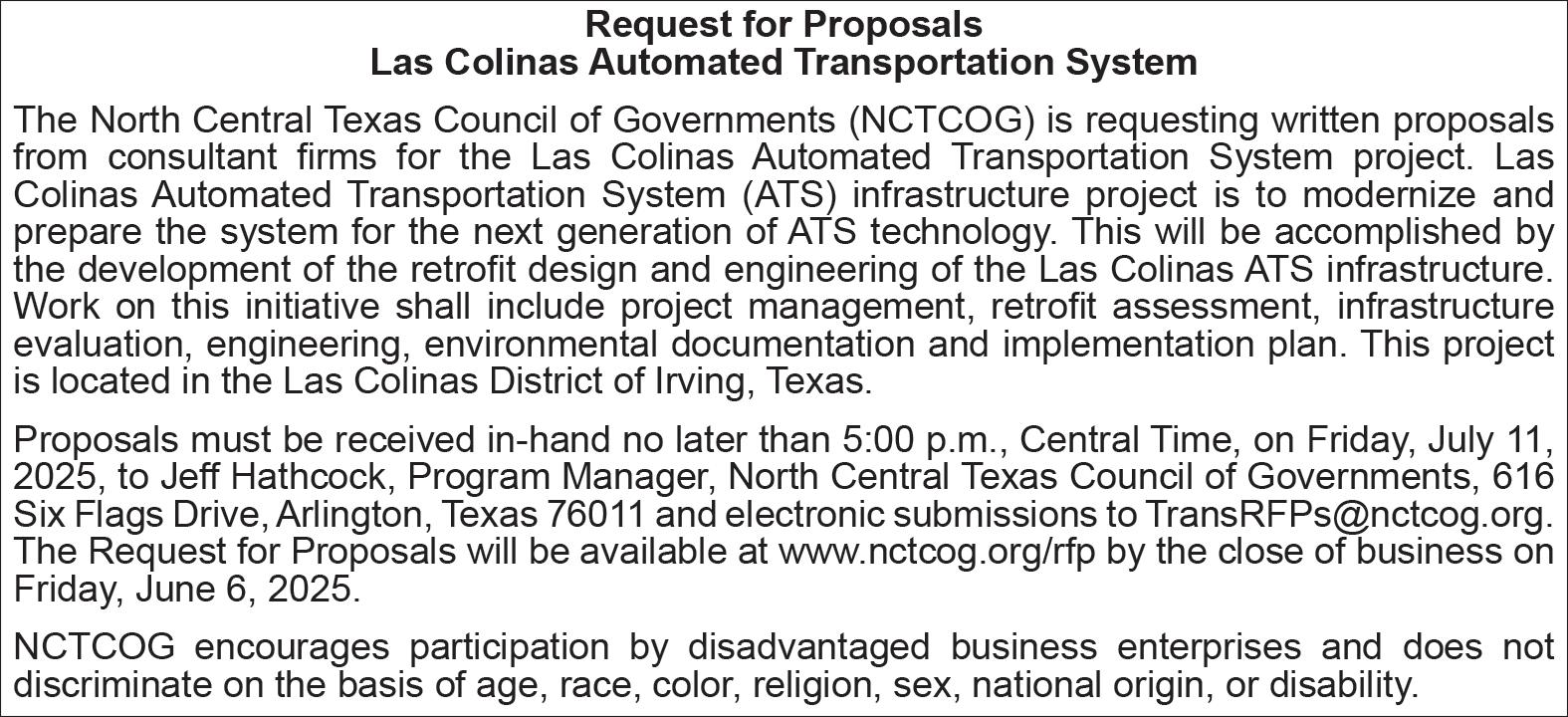
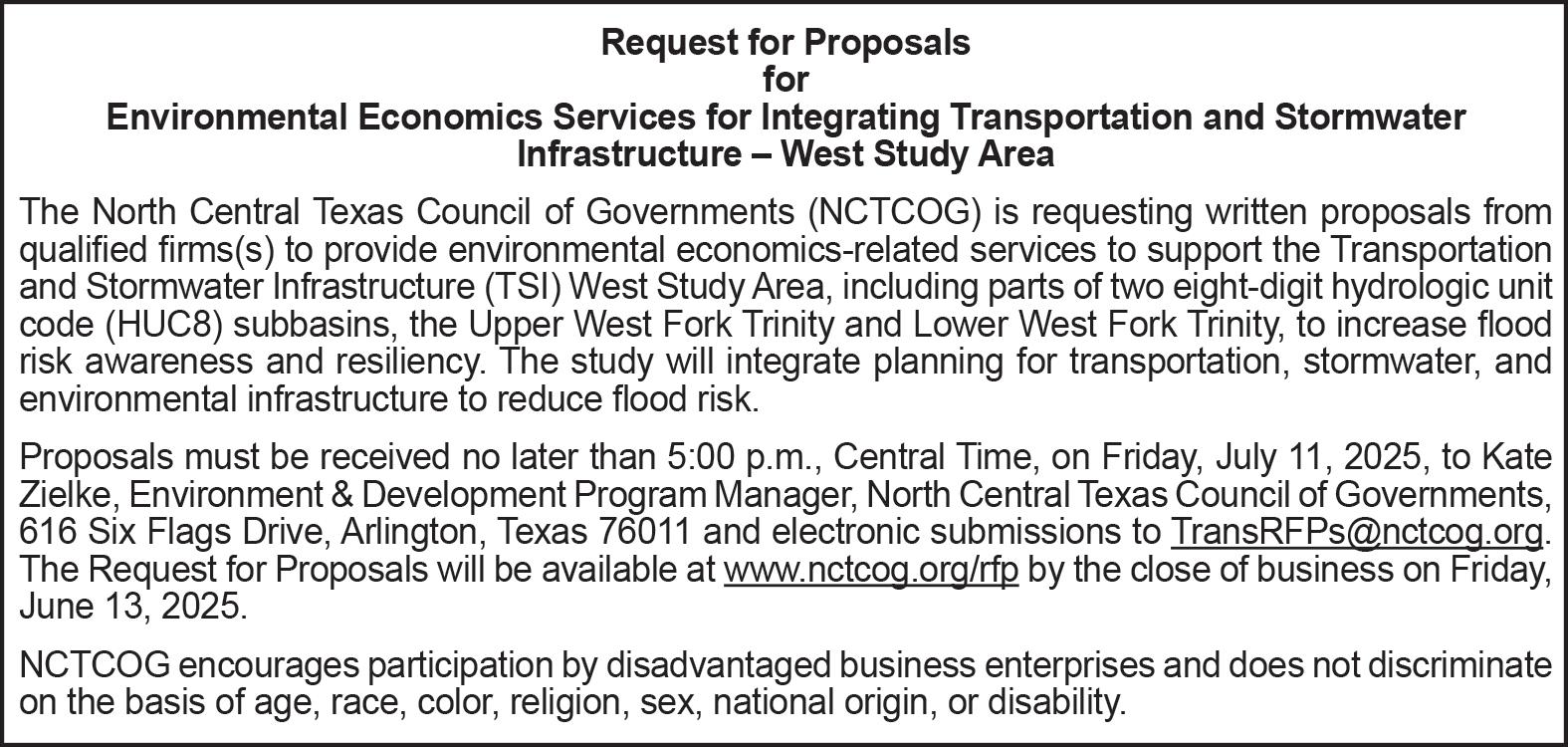
Continued from page 4
dent, Jesus, God would fulfill His most important promise. Through Jesus, God offers reconciliation and peace (Romans 5:1). God’s offer of grace comes
to people who are counted as “enemies” before God (Romans 5:10). Therefore, we can take consolation that, even though human alliances can fail, the peace that God grants through Jesus will never fail; God is always faithful
to keep His promises. Thought to Remember: God keeps His covenant promises. Standard Publishing. KJV Standard Lesson Commentary® 2024-2025 (p. 996). (Function). Kindle Edition.

Cedric
Oklahoma City Thunder #7 Chet Holmgren with the Defense against the Indiana Pacers #23 Aaron Nesmith
Photo Courtesy of the OKC Thunder
Here’s What’s Happening Here’s What’s Happening
Ongoing Events
Are you a resident of the Rolling Hills area? Join the Glencrest Civic League Neighborhood Association and become part of our mission to create a safe, secure, clean, and well-maintained community. We actively seek residents’ support for our mission by spearheading neighborhood committee initiatives, coordinating, supporting, and planning various community events, actively engaging local leaders and nurturing a strong sense of community unity.
Join us for our Monthly Community Meetings:
• When: 10:00 AM on the 3rd Saturday of Each Month
• Where: C.R. Bradley Center, 2600 Timberline Drive, Fort Worth, TX 76119. For more information and to become a member, check out our Facebook Page (Glencrest Civic League Neighborhood Association) or visit our website at https:// www.glencrest.org. You may also email us at glencrest. na@gmail.com.
Fort Worth Wiley College Alumni Club Membership Meeting: Second Saturday of each month, 1 p.m., Carter Metropolitan CME Church, 4601 Wichita St. Fort Worth 76119. For additional information, contact one of the following members: Helen Crowder (817) 688-8937, Larry Pugh (817) 293-6543, Daisy Kahn (817) 292-1077.
I.M. Terrell Alumni Association Membership Meeting, 1st Tuesday of each month, 5 p.m., I. M. Terrell Stem/VPA Academy, 1411 I M Terrell Way, Fort Worth 76102.
M.L.Kirkpatrick Alumni Association Membership Meeting: First Saturday of each month at 2 p.m. at Shiloh Missionary Baptist Church, 2823 North Houston Street, Fort Worth 76106.
P.L. Dunbar Alumni Association Memberships Meeting: 3rd Saturday of each month at 3p.m. at The CenterFor STOP SIX HERITAGE, 5100 Willie St. next to Young Men’s Leadership Academy, Fort Worth. pldalumniassoc@gmail.com
Como Alumni. Every third Tureday, 7 p.m., Como Community Center, 4900 Horne Street, Fort Worth, TX 76107
Join the Texas Coalition of Black Democrats! We meet every fourth Saturday of the month from 5-6 p.m. at the Charles F. Griffin Sub-courthouse, 3500 Miller Ave. Fort Worth 76119. New Monthly Speakers.
United Methodist Church, 522 Missouri Ave. Fort Worth 76104. The Food pantry is open on the third Saturday of each month from 8 -10 a.m. For questions or concerns, please contact the Church Office at (817) 336-2117.
Forest Hill Ushers Union, “Welcomes All Church Ushers/Doorkeepers in Tarrant County” Juniors & Young People (7-18) Young Adults (19-35) Seniors (36+)
Affiliations: Texas Church Ushers
Southern Region Ushers
National United Church Ushers Association of America, Inc. (NUCUAAA) For more information contact: Wanda King (817) 821-3017, Helen Moore (817) 584-7370, Thomas E. Troupe (817) 2292509
AARP Southeast Chapter #4508. Meets the 4th Wednesday of each month at 10:30 a.m., Southside Community Center, 959 E. Rosedale, Fort Worth, TX 76104. For additional information contact Debra Rivers by email:riv3ers@sbcglobal.net.
The Fort Worth Association of Federated Women’s Clubs organization aims to unite women in their efforts to serve the underserved, strengthen the community, and create opportunities for volunteerism, civic activism, education, and cultural enrichment. Below are some of the organization’s community service projects: Individuals must provide their own transport action
Senior Bingo - bingo and health speakers are on the first Friday of each month. From 10:00 till 12:00
Our program, Senior Bingo, aims to combat social isolation among seniors. Research has shown that older adults who experience social isolation are at an increased risk for cognitive decline, heart disease, and a variety of mental and physical health issues.
To address this concern, we organize a monthly social event where seniors can connect and engage their minds. This gathering takes place in an area with the lowest life expectancy in the state. Participants have the chance to socialize, play games, and share meals. Additionally, we invite guest speakers to discuss important topics, including health and legal issues.
Senior Box ProgramBoxs of food first Friday 12:30 till 2:30
FWAFWC partners with
the Tarrant Area Food Bank to distribute food through the Senior Box Program. This program, part of the Commodity Supplemental Food Program, allows qualifying seniors aged 60 and older to receive a monthly box of USDA foods to supplement their diets. Each box contains shelf-stable items, including canned fruits and vegetables, cereal, canned meats, juice, and a block of cheese.
Some local food banks have observed an increase in the number of seniors using their services toward the end of each month. They found that seniors rely on these services to help them get by until their next Social Security checks. The Senior Box Program is an ideal fit for the needs of seniors in the area near our building. We distribute the food boxes from our location, which is situated in one of the city’s designated food deserts. In this area, some residents may have to travel up to an hour by bus to access healthy food options.
Diaper Bank - Diapers first Friday 12:30 till 3:00. FWAFWC is a partner agency of the Junior League of Fort Worth (JLFW). The JLFW Diaper Bank aims to eliminate diaper needs and enhance the physical, mental, and financial well-being of children and adults throughout Tarrant County. It provides diapers at no cost to local nonprofit partners that assist individuals facing poverty, mobility issues, or health limitations. Since its inception, the JLFW Diaper Bank has provided over 2 million diapers to nearly 100 nonprofit organizations.
Computer Classes -Computer classes each Monday 1:00 till 2:30 FWAFWC has
partnered with Goodwill of North Texas to offer computer classes at our facility. These classes provide an invaluable resource to the community by equipping individuals with essential computer skills and knowledge. By enhancing residents’ digital literacy, participants will learn how to navigate the internet and apply for jobs online. Additionally, the classes will cover important topics such as online safety, email usage, social media, and other forms of digital communication.
Thur. June, 19, 2025
Opal’s Walk For Freedom,Farrington Field, Fort Worth, TX . Walk starts at 9:00 a.m. register at www. juneteenthstrong.com
Wed. June, 25, 2025
Art Tales at the Carter!
Working Together
Team up for a collaborative morning inspired by Jean Shin: The Museum Body. Join us for group storytelling, creative play, and a musical performance by David Chicken.
Wed. July, 2, 2025
Art Tales at the Carter! Red, White, And Blue
Reflect on freedom and community ahead of Independence Day. Enjoy a morning full of stories, art making, and a special guest performance from storyteller Maricela and Friends.
Wed. July, 9, 2025
Art Tales at the Carter!
Snack Attack
Satisfy your artistic sweet tooth! Inspired by foodthemed artworks, this day features tasty tales, imaginative art making, and a lively
performance by Brown Girls Do Ballet.
Wed. July, 16, 2025
Art Tales at the Carter!
Powerful Patterns
Spot polka dots, stripes, and zigzags across the Carter! Enjoy a pattern-filled morning of stories, hands-on fun, and a performance by A Real Mad Hatter.
Wed. July, 23, 2025
Art Tales at the Carter!
Fun, Feathers and Scales
From sea creatures to prairie dwellers, animals take center stage! Explore wild artworks with The Creature Teacher, plus themed stories, games, and art making.
Wed. July, 30, 2025
Art Tales at the Carter!
Material Mixup
Wrap up the summer with a creative celebration! Repurpose materials into imaginative art and enjoy music from Brandi Waller Pace, alongside favorite activities from the season.
Sat. Aug, 12, 2025
10th Annual Healthy Lives Matter: Alzheimer’s Education Seminar. 9:00 am - 2:00 pm. TCC Trinity River Campus, 300 Trinity Campus Circle, Fort Worth TX 76102
Public Transportation Help
Service modifications June 2025
Trinity Metro is launching the Blue Line, updating hours and increasing frequency beginning on Sunday, June 8. The
new color-coded route replaces Molly the Trolley and will feature bright blue buses with downtown-themed designs. Additionally, several modifications will be implemented to reflect necessary detours for long-term construction projects across the system.
Route 2 Camp Bowie — Update the turn-by-turn directions to accurately represent the current route the bus is taking to bypass the ongoing longterm construction project along Camp Bowie Blvd. between Montgomery and University Drive.
Route 12 Samuels/Mercantile Center Station — Update the turn-by-turn directions to accurately represent the current route the bus is taking to bypass the ongoing long-term construction project at NE 28th Street and Decatur Avenue.
Molly The Trolley — Rebrand as Blue Line, change service hours to 7 a.m.-7 p.m., and increase frequency to every 7 minutes.
Orange Line — Update the turn-by-turn directions to accurately represent the current route the bus is taking to bypass the ongoing long-term construction project at NE 28th Street and Decatur Avenue.
Route 52 Hulen — Update the turn-by-turn directions to accurately represent the current route the bus is taking to bypass the ongoing long-term construction project along Camp Bowie Boulevard between Montgomery Street and University Drive.
Route 91 North Side Station/Normandale — Update the turn-by-turn directions to accurately represent the current route the bus is taking to bypass the ongoing long-term construction project at NE 28th Street and Decatur Avenue.
